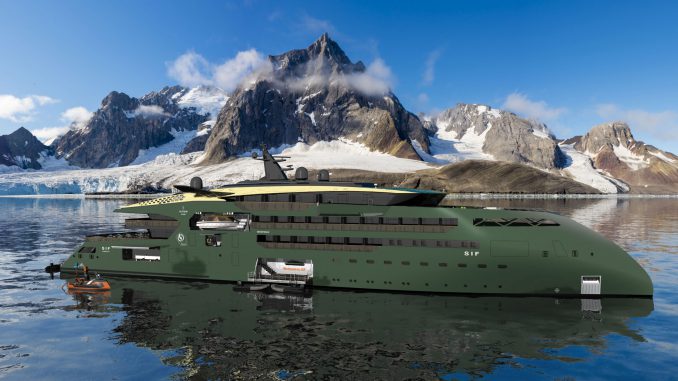
A potential answer to a sustainable cruise ship industry has been announced in the shape of a nuclear-powered vessel named Thor.
Norway-based company Ulstein say the eye-catching 149m (489ft) replenishment, research and rescue ship concept is powered by a thorium Molten Salt Reactor (MSR) that can be used to recharge battery-driven cruise ships at sea.
This enables the vessel to operate as a mobile power/charging station for a new breed of battery driven cruise ships.
Ulstein claim Thor’s charging capacity has been scaled to satisfy the power needs of four expedition cruise ships simultaneously. Thor itself would never need to refuel. As such, the ship is intended to provide a blueprint for entirely self-sufficient vessels of the future.
“The vessel concept is capable of making the vision of zero-emission cruise operations a reality,” the firm states.
Ulstein believes the concept may be the missing piece of the zero emissions puzzle for a broad range of maritime and ocean industry applications.
To demonstrate its feasibility, Ulstein has also developed the Ulstein Sif concept, a 100m-long, 160 POB capacity, zero-emission expedition cruise ship. This Ice Class 1C vessel will run on next-generation batteries, utilising Thor to recharge while at sea.
Sif would accommodate up to 80 passengers and 80 crew, offering silent, zero-emission expedition cruises to remote areas, including Arctic and Antarctic waters.
Thor would feature helicopter pads, firefighting equipment, rescue booms, workboats, autonomous surface vehicles and airborne drones, cranes, laboratories, and a lecture lounge.

“We have the goals, ambition and environmental imperative to switch to zero-emission operations, but, until now, we haven’t had the solution,” comments CEO Cathrine Kristiseter Marti, Ulstein. “We believe ‘Thor’ might be the answer we’ve been looking for. ‘Thor’ is essentially a floating, multi-purpose ‘power station’ that will enable a new battery revolution.”
“Expedition cruise ships operate in increasingly remote, and environmentally fragile, areas. At the same time, the industry faces growing pressure from diverse stakehZenger News to preserve nature as it is and ban the environmental impact of cruising. ‘Thor’ enables replenishment of energy and supplies on site, while also boasting the technology to facilitate rescue operations, as well as conducting research tasks. It is, in effect, a crucial piece of infrastructure to support sustainable and safer operations. ‘Thor’ literally has the power to change our entire industry,” states Marti.
Thorium has been identified as having huge potential for a maritime industry hunting for clean alternative fuels.
Ulstein explain: “MSRs are safe, efficient and operationally proven solutions that work by dissolving Thorium – an abundant, naturally occurring metal with low radioactivity – in liquid salt. The ensuing chain reaction heats the salt, producing steam to drive a turbine and create electricity.

“Although developments on land are well documented, its potential for delivering clean maritime power has yet to be incorporated into a vessel design. Ulstein, famed for innovating the revolutionary X-BOW® design, has seen an opportunity to change that, potentially heralding a new dawn of clean power for cruise and maritime operations.”
Speaking about the suitability of Thorium MSRs as an energy source for maritime applications, Jan Emblemsvåg, Professor at the Norwegian University of Science and Technology, an expert in the field of Thorium and nuclear power generation, notes: “MSRs have enormous potential for enabling clean shipping. There is so much uncertainty over future fuels, but here we have an abundant energy source that, with the right approach, can be safe, much more efficient, cheaper, with a smaller environmental footprint than any existing alternative.”
“From my perspective, I see this as the most viable, and potentially the only credible, solution for a zero-emission fleet that can operate under commercial terms and cost levels. The ‘Thor’ concept is exactly the kind of innovation we need for sustainable success at sea.”
Both Thor and ‘Sif’ feature Ulstein’s eye-catching X-BOW® design, created for greater operability, comfort, operational functionality and fuel efficiency.
“Here we have two concepts in one to showcase a cleaner, safer and more sustainable way ahead for cruise ship owners and operators, not to mention maritime in general,” says Øyvind G. Kamsvåg, Chief Designer at Ulstein. ‘Thor’ and ‘Sif’ demonstrate what is possible when we approach challenges from a new direction.
“We have huge confidence in this solution and want to engage further in conversations about how we can enable the necessary changes the world demands”, adds Lars Ståle Skoge, Commercial Director at Ulstein Design & Solutions AS. “I’m excited to see where ‘Thor’ and ‘Sif’ can take us as we look to a zero emissions horizon.”
Recommended from our partners
The post Nuclear-Powered Vessel Named Thor Could Be Next Generation Of Sea Travel appeared first on Zenger News.
